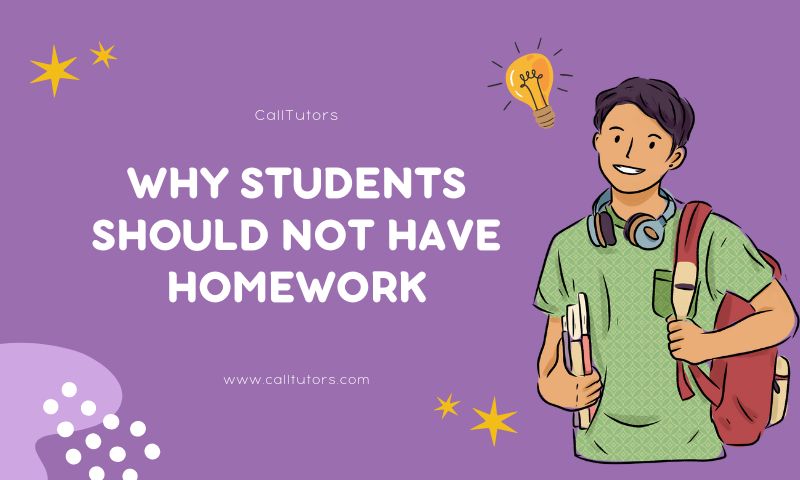Do you want to know why students should not have homework? if yes, then have a close look at this blog post to explore everything on why students should not have homework.
In today’s education landscape, the debate surrounding the necessity of homework has gained significant attention. Many educators, parents, and students are questioning whether assigning homework is truly beneficial or if it imposes unnecessary burdens on students.
The traditional practice of assigning homework after school hours has long been ingrained in the education system, but a growing body of research and evolving perspectives challenge its effectiveness and impact on students’ well-being.
In this article, we will explore the reasons why students should not have homework, delving into the potential negative consequences and offering insights into alternative approaches that prioritize holistic learning and student well-being.
By examining the various arguments against homework, we aim to foster a meaningful dialogue and reimagine the role of homework in today’s educational landscape.
why students should not have homework?
Table of Contents
Here are some reasons why students should not have homework:
Limited Time for Extracurricular Activities

Homework consumes a significant portion of students’ free time, leaving little room for participation in extracurricular activities such as sports, clubs, or hobbies.
These activities are essential for a well-rounded education and promote physical fitness, social interaction, and personal growth. It is one of the key reasons on why students should not have homework.
Increased Stress and Anxiety

The pressure to complete homework assignments within strict deadlines can lead to increased stress and anxiety among students.
This constant academic burden can have detrimental effects on their mental and emotional well-being, hindering their ability to focus and perform optimally in other areas of their lives. It is one of the key reasons on why students should not have homework.
Negative Impact on Mental Health

Excessive homework can contribute to mental health issues, such as depression and burnout. Students may experience feelings of overwhelm, helplessness, and a constant fear of failure.
Prioritizing students’ mental health is crucial for creating a positive learning environment. It is one of the key reasons on why students should not have homework.
Reduced Quality Family Time

The presence of homework often diminishes the quality of family time. Instead of engaging in meaningful conversations and shared activities, students may find themselves isolated, buried under piles of assignments.
This lack of quality family time can weaken family bonds and hinder the overall development of students. It is one of the key reasons on why students should not have homework.
Inequality and Accessibility Issues

Homework can exacerbate inequalities among students. Students from disadvantaged backgrounds may lack access to necessary resources.
Such as a quiet study environment or reliable internet connection, making it difficult for them to complete assignments. This further widens the educational gap and perpetuates inequality. It is one of the key reasons on why students should not have homework.
Lack of Rest and Free Time

Rest and free time are vital for students’ well-being and cognitive development. Without adequate time for relaxation and pursuing personal interests, students may experience fatigue and mental exhaustion.
Ultimately hindering their ability to absorb and retain information effectively. It is one of the key reasons on why students should not have homework.
Strain on Teacher-Student Relationships

Excessive homework can strain the relationship between teachers and students. It may lead to frustration, disengagement, and a lack of enthusiasm for learning.
Building positive and supportive teacher-student relationships is crucial for effective education. It is one of the key reasons on why students should not have homework.
Encourages Academic Dishonesty

Homework assignments can sometimes lead to academic dishonesty, such as copying from others or seeking external help to complete tasks. This undermines the integrity of the educational process and diminishes the value of learning.
It is one of the key reasons on why students should not have homework.
Insufficient Time for Self-Reflection

Homework often leaves little time for students to reflect on what they have learned and connect concepts to real-life situations.
Reflection is a vital part of the learning process and allows students to deepen their understanding and make meaningful connections. It is one of the key reasons on why students should not have homework.
It is important to note that while these reasons highlight the negative aspects of homework, there may be instances where homework can still be beneficial when used appropriately and in moderation.
Benefits of Homework
Check out the benefits of homework.
Reinforcement of Learning
Homework provides an opportunity for students to reinforce and practice the concepts and skills learned in class. It helps solidify their understanding and retention of the material.
Independent Work and Responsibility
Homework encourages students to develop important skills such as self-discipline, time management, and responsibility. It requires them to plan and organize their work, meet deadlines, and take ownership of their learning.
Preparation for Future Assignments and Exams
Homework prepares students for future assignments, projects, and exams. It allows them to apply what they have learned in class and gain confidence in their abilities.
Development of Critical Thinking Skills
Homework assignments often require students to think critically, analyze information, and solve problems independently. These skills are essential for their academic success and future endeavors.
Extension of Learning Beyond the Classroom
Homework extends learning beyond the boundaries of the classroom. It encourages students to explore additional resources, conduct research, and engage in independent study, fostering a deeper understanding of the subject matter.
Practice for Real-Life Situations
Homework can provide practice for real-life situations and challenges that students may encounter. It helps them develop problem-solving skills and apply academic knowledge to practical scenarios.
Parental Involvement and Support
Homework provides an opportunity for parents to be involved in their child’s education. It allows parents to understand what their child is learning, monitor their progress, and offer guidance and support when needed.
Time Management and Prioritization
Homework teaches students valuable skills in time management and prioritization. They learn how to balance multiple assignments, extracurricular activities, and personal commitments, preparing them for the demands of adulthood.
Feedback and Assessment
Homework assignments give teachers the opportunity to provide feedback and assess students’ understanding and progress. This feedback helps students identify areas for improvement and adjust their learning strategies accordingly.
Preparation for College and Career
Homework prepares students for the expectations and workload they will face in college and future careers. It helps develop the skills needed for higher education and professional success, such as research, critical thinking, and time management.
While there are valid arguments on both sides of the homework debate, these reasons highlight the potential benefits that homework can offer when used effectively and in moderation.
It is essential to strike a balance between homework and other aspects of students’ lives to ensure a holistic and meaningful educational experience.
Why students should not be given homework?
Students should not be given homework for several compelling reasons:
Limited Time for Other Activities
Homework consumes a significant portion of students’ free time, leaving them with little opportunity to engage in extracurricular activities, pursue hobbies, or spend quality time with their families.
These activities are essential for their social, emotional, and physical development.
Increased Stress and Anxiety
Excessive homework can lead to heightened levels of stress and anxiety among students. The pressure to complete assignments within strict deadlines, manage multiple subjects, and maintain academic performance can take a toll on their mental well-being.
Negative Impact on Mental Health
The constant workload of homework can contribute to mental health issues such as depression, burnout, and sleep deprivation.
Students may experience feelings of overwhelm, fatigue, and a lack of motivation, hindering their ability to thrive academically and emotionally.
Inequality and Accessibility Issues
Homework assignments may inadvertently perpetuate inequality among students. Not all students have access to the same resources or support outside of school, such as a quiet study environment, necessary materials, or internet access.
This discrepancy can create unfair advantages and further widen the achievement gap.
Reduced Family Time and Well-being
Homework can disrupt family dynamics and reduce the quality of family time. Instead of fostering meaningful connections and engaging in shared activities.
Students may find themselves isolated and overwhelmed by homework, impacting their overall well-being and family relationships.
Potential for Academic Dishonesty
Homework assignments can increase the likelihood of academic dishonesty, such as copying from others or seeking external help.
This undermines the integrity of the educational process and inhibits the development of genuine understanding and knowledge.
Limited Effectiveness
Research on the effectiveness of homework is inconclusive, with no clear evidence that it significantly enhances academic performance in the long term.
The quality and purpose of homework assignments vary, and often, students may prioritize completing assignments rather than focusing on deeper comprehension and critical thinking.
Development of Autonomy and Self-Directed Learning
Without the burden of homework, students have the opportunity to cultivate their autonomy and engage in self-directed learning.
They can explore their own interests, pursue independent research, and develop a love for learning outside the confines of traditional homework assignments.
Importance of Rest and Well-being
Rest is crucial for students’ cognitive functioning, memory consolidation, and overall well-being. Removing homework allows students to have sufficient time for relaxation, rejuvenation, and pursuing activities that promote their physical and mental health.
Alternative Learning Approaches
Eliminating or reducing homework opens up space for alternative learning approaches that prioritize hands-on experiences, project-based learning, and interactive classroom activities.
These methods foster deeper understanding, critical thinking, and collaboration among students.
By reevaluating the necessity of homework, we can create a more balanced and student-centric education system that promotes well-rounded development, mental health, and a love for learning.
It is essential to prioritize students’ overall well-being and create a supportive environment that values their diverse needs and aspirations.
What are 3 reasons why homework is bad?
There are several reasons why homework can be considered detrimental. Here are three key reasons why homework is often viewed as bad:
Excessive Workload and Stress
Homework often contributes to an excessive workload for students, which can lead to high levels of stress and anxiety. The pressure to complete numerous assignments within strict deadlines can be overwhelming.
Leaving students with limited time for rest, relaxation, and extracurricular activities. This prolonged stress can negatively impact their mental well-being and overall health.
Lack of Individualization and Creativity
Homework assignments are typically standardized and designed for the entire class, disregarding the diverse learning needs and interests of individual students.
This lack of individualization can stifle creativity and hinder students’ ability to explore topics in depth or pursue their unique areas of interest. It limits their opportunity for self-expression, critical thinking, and independent problem-solving.
Inequality and Disparities
Homework can exacerbate existing inequalities among students. Not all students have equal access to resources and support outside of school, such as a quiet study environment, necessary materials, or parental assistance.
This inequality can create disparities in the quality and completion of homework assignments, further widening the achievement gap and perpetuating educational inequity.
It is important to note that while these reasons highlight the negative aspects of homework, there are instances where homework can be beneficial when used appropriately and in moderation.
The key is to strike a balance that considers students’ well-being, fosters a love for learning, and acknowledges their diverse needs and abilities.
What are disadvantages of homework?
There are several disadvantages associated with homework. Here are some key disadvantages of assigning homework to students:
Increased Stress and Anxiety
Homework often leads to increased levels of stress and anxiety among students. The pressure to complete assignments within tight deadlines, manage multiple subjects, and maintain academic performance can be overwhelming.
This stress can have a negative impact on students’ mental well-being and overall health.
Reduced Free Time
Homework takes up a significant portion of students’ free time, leaving them with limited opportunities to engage in extracurricular activities, pursue hobbies, or spend quality time with family and friends.
The lack of free time can result in feelings of burnout, isolation, and a compromised work-life balance.
Negative Impact on Sleep Patterns
The workload of homework, particularly in the evenings, can disrupt students’ sleep patterns. Late nights spent completing assignments can lead to insufficient sleep, which negatively affects concentration, memory, and overall academic performance.
Inequality and Accessibility Issues
Homework assignments can exacerbate inequalities among students. Not all students have equal access to resources, such as a quiet study environment, necessary materials, or parental assistance.
This inequality can create disparities in the completion and quality of homework, widening the educational gap.
Potential for Academic Dishonesty
Homework assignments can increase the potential for academic dishonesty, such as copying from others or seeking external help to complete tasks.
This undermines the integrity of the educational process and diminishes the value of independent learning and critical thinking.
Limited Effectiveness
Research on the effectiveness of homework is inconclusive, with mixed evidence regarding its impact on academic achievement.
Homework quality and purpose vary widely, and often, students may prioritize completing assignments over deeper comprehension and critical thinking. This raises questions about the overall effectiveness of homework as a learning tool.
Strained Teacher-Student Relationships
Excessive homework can strain the relationship between teachers and students. When students feel overwhelmed by the workload or struggle to complete assignments.
It can lead to frustration, disengagement, and a lack of enthusiasm for learning. Building positive and supportive teacher-student relationships becomes challenging in such circumstances.
Interference with Personal Development
Homework can interfere with students’ personal development, preventing them from engaging in activities that foster social skills, physical fitness, and emotional well-being.
Students need time for self-reflection, pursuing personal interests, and developing non-academic aspects of their lives.
It is important to note that while these disadvantages highlight the negative aspects of homework, it is essential to strike a balance and consider the individual needs and circumstances of students.
\The quality, purpose, and quantity of homework should be carefully evaluated to ensure it promotes meaningful learning, supports well-being, and respects the diverse needs of students.
Conclusion
In conclusion, the arguments against students having homework are compelling and deserve serious consideration. The negative impact of excessive homework on students’ well-being, mental health, and overall development cannot be overlooked.
Students need time for rest, relaxation, pursuing personal interests, and engaging in extracurricular activities that contribute to their holistic growth.
Eliminating homework does not mean neglecting academics. Instead, it provides an opportunity to explore alternative approaches that foster meaningful learning experiences, such as project-based learning and collaborative assignments.
These methods promote critical thinking, creativity, and problem-solving skills while allowing students to have a balanced and fulfilling educational journey.
Moreover, the disparities in access to resources and support outside of school can perpetuate inequalities when it comes to completing homework assignments.
By removing homework, we can create a more inclusive education system that ensures equal opportunities for all students, regardless of their backgrounds or circumstances.
It is important to prioritize the well-being and mental health of students. By relieving them from the constant pressure and stress of homework, we create an environment that allows for optimal learning, engagement, and personal growth.
Education should be a joyful and transformative experience, and by reevaluating the role of homework, we can better align it with these ideals.
Ultimately, the goal of education is to nurture well-rounded individuals who are prepared for the challenges of the future. By reconsidering the necessity of homework and embracing innovative approaches.
We can create a more effective and balanced educational system that supports the overall development and success of every student.
Frequently Asked Questions
Won’t eliminating homework result in students falling behind in their studies?
No, eliminating traditional homework does not mean neglecting academics. Alternative approaches, such as project-based learning and in-class work, provide opportunities for students to deepen their understanding and develop essential skills.
How can students learn time management without homework?
Time management skills can be learned through various activities, including prioritizing tasks, setting goals, and balancing academic and personal commitments. Students can practice these skills in real-life situations rather than being confined to homework assignments.
What about the importance of practice and reinforcement of concepts?
Practice and reinforcement are crucial for learning, but they can be achieved through in-class activities, interactive discussions, and hands-on experiences. These methods provide a more engaging and effective way to reinforce concepts than traditional homework.
What can parents do to support their children’s education without homework?
Parents can actively engage with their children’s education by encouraging reading, discussing current events, and participating in educational outings. They can also support their children’s interests and provide a conducive learning environment at home.
How can schools ensure equal access to resources for students if homework is eliminated?
Schools can take proactive measures to ensure equal access to resources by providing study spaces, extending library hours, and offering technology assistance to students who may face challenges accessing resources at home.



